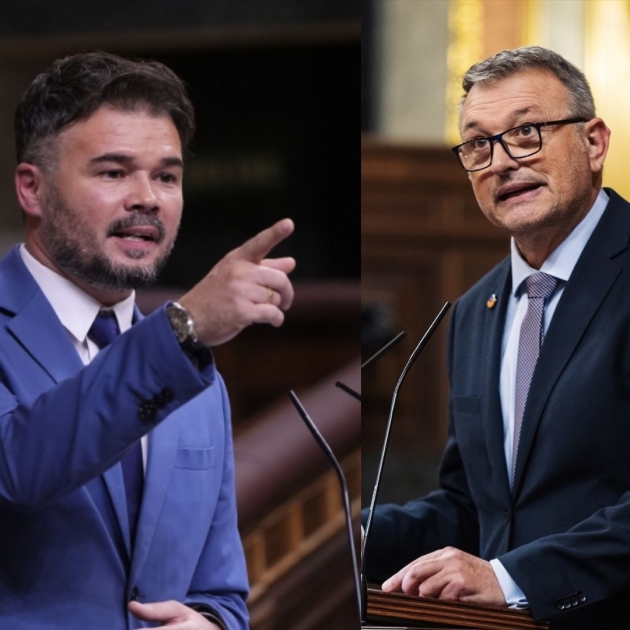Legislation of a momentous importance. That was how Spain's future amnesty law was depicted by the two main Catalan pro-independence parties, the Catalan Republican Left (ERC) and Together for Catalonia (Junts) this Tuesday, during the first debate on the amnesty bill registered by the Socialists (PSOE), which plans to put an end to court prosecutions related to the Catalan independence process. Gabriel Rufián, spokesperson for the Republicans in the lower house, asserted that in Catalonia "we are ready to win or lose a referendum" and wondered "what will happen in four years". From Junts, Girona MP Josep Maria Cervera stressed that the amnesty will "help open" the way for "a negotiation between two nations, the Spanish and the Catalan, on equal terms".
"A window of opportunity 300 years later"
On behalf of Junts, Josep Maria Cervera emphasized that his party's decisive role thanks to the electoral arithmetic of the 23rd July election "has opened a window of opportunity 300 years later to be able to focus on the [Catalonia-Spain] conflict from its origin and generate the necessary scenario to start a political negotiation".
Cervera also addressed ERC critically, saying that the work done by Junts was "for the country" and not "another milestone on the path that some started on their own with pardons and penal reform that sought forgiveness and an acceptance of the injustice of recognizing that the October 1st referendum was a crime", while also allowing the "political activism of the judiciary" to continue and giving no opportunity for those accused of terrorism for the Tsunami protests - nor ERC own general secretary, nor for the Catalan president in exile, nor for many others".
Josep Maria Cervera (Junts): "Some started a path by themselves looking for forgiveness and accepting the injustice of the 1st October"
Amnesty: "not about forgiveness or coexistence"
The Junts deputy claimed that the amnesty "is not a measure of grace" and presented it as "a necessary device that arises from the agreement between democrats to end the judicialization of politics that has led to the suffering of a lot of people". He proclaimed that the amnesty "will in no way mean that our people forget and forgive" nor will it be "a renunciation of the independence of Catalonia" and insisted that "it is not about forgiveness or coexistence", but "about repairing an injustice" and of "creating justice", which "the judges and courts, which have prioritized the unity of the homeland by abusing criminal law to punish dissent, have not done".
Regarding the warning given by the People's Party (PP) to turn to Europe, the MP was clear: "We'll wait for you there, Europe is the playing field of Junts". And he took the opportunity to assert that "some of those who shout and gesticulate the most", those who "have politicized justice, moving away from the standards of European law", will be "the main beneficiaries of this amnesty", since they will avoid submitting "to the scrutiny of the European courts".
He emphasized that the parliamentary passage of the amnesty bill is "a recognition of the error of having judicialized the political conflict" and he concluded his speech by making it clear that "the amnesty will help open a very difficult path: that of negotiation between two nations, the Spanish and the Catalan". A negotiation that he classified as taking place "on equal terms, to decide our future", a future that, for Junts, "can only be that of a free Catalonia".
ERC: "Oh, my friend, what will happen in four years?"
In his speech, Gabriel Rufián, ERC spokesperson in Congress, presented the amnesty as "a political solution" that "settles a debt with Catalonia" and went one step further: "In Catalonia we are ready to win or to lose a referendum. And you?". He recalled that "four years ago a meeting like this was impossible" and left a question in the air: "Oh, my friend, what will happen in four years?".
Gabriel Rufián (ERC): "In Catalonia we are ready to win or to lose a referendum. And you, honourable members?"
"And Feijóo has the nerve to talk about corruption"
However, the ERC deputy addressed almost all of his speech at Alberto Núñez Feijóo, leader of the opposition People's Party (PP). Rufián reprimanded him for having "the nerve to talk about corruption" affirming that the amnesty is political corruption and reading to the PP leader a list of corruption cases affecting the Spanish right-wing party. He also criticized that Feijóo had "the nerve to talk about electoral fraud" over a law that "may appeal to him a great deal, very little or an average amount", but which will be "a law passed by the immense majority of this chamber", which "is the essence of democracy".
The Republican spokesperson claimed that the amnesty "was indeed on the electoral programme of the Republican Left" and recalled that "for 40 years, many pacts and many laws have been passed by governments that were not on electoral programmes".
He also answered Feijóo directly, when the PP asked both him and Junts's Míriam Nogueras if, with the amnesty, he will feel "more united to Spain than ever": "No, just the same. It's nothing new. In fact, it's an imposition: no one has asked me if I want to be Spanish or if I don't want to be, just like many people in Catalonia."
